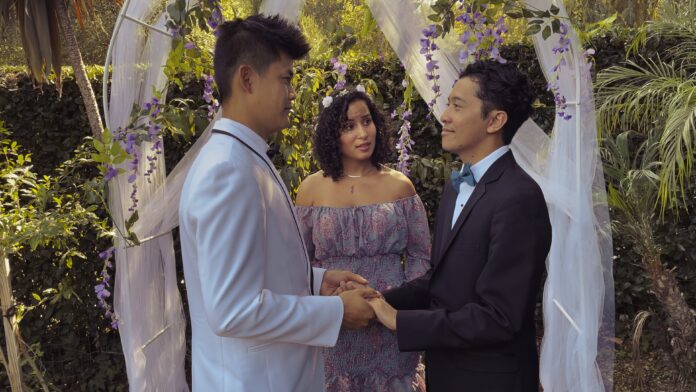“Last Summer of Nathan Lee,” available on VOD Nov. 22, is out filmmaker Quentin Lee’s earnest yet charming drama chronicling the transformative period of the title character’s life.
Nathan (Harrison Xu) is a charismatic high school senior who has applied to Yale for college. But the day before his 18th birthday, Nathan learns he has brain cancer. Determined to “live life to the fullest” before he dies, he asks his gay best friend Dash (Matthew Mitchell Espinosa), a budding filmmaker, to record all the events in his life — “even the vomit.” (And Nathan is seen vomiting, but it is a result of drinking too much, not because of his medical condition.)
As such, director Quentin Lee films “The Last Summer of Nathan Lee” as a kind of mockumentary, where Nathan hopes to leave a “legacy” of his time on earth. Nathan’s first goal (post diagnosis) is to not die a virgin. He remedies that situation at a party by sleeping with April (Dru Perez), a classmate. Meanwhile, Dash, develops a romantic interest in Caleb (Aaron Guest), who hopes to study fashion design. At the same party, Nathan also meets another classmate, Lorelei (Natasha Tina Liu), and becomes infatuated with her. Nathan and Lorelei start getting chummy, much to Dash’s chagrin. (Because gay guys hate it when their straight best friends start liking girls!)
The romantic drama on display is very much of the high school variety, and Lee’s film is certainly going to resonate most with younger viewers.
There is some poignancy to Nathan’s interactions because the only ones who know about Nathan’s cancer are his stern widowed father, Winston (Albert Park), his sister (Lauren Mei), and Dash. He does not want his friends to know and “look at him differently, or pity him.”
Nathan’s dying is never out of mind, as scenes depict him taking pills, having headaches, and experiencing some uncomfortable moments. But “The Last Summer of Nathan Lee” is focused mostly on Nathan hanging out with his friends at Lorelei’s place because she lives alone. In one scene, Lorelei and Nathan start dancing and she encourages Dash to join them, which he does. It is not long before Nathan and Dash are kissing — which may confuse or kill the friendship between these guys who have known each other since second grade.
Thankfully, the teens are mature enough to express their thoughts and feelings openly and honestly with each other. What is more, the film shows early on, that Dash and Nathan get married, which may suggest a love that goes beyond brotherly. But the wedding has another purpose, revealed later in the film.
“The Last Summer of Nathan Lee” does not dwell on Nathan’s sexuality. He is someone who claims he was “sleepwalking through life” and worked hard to get into Yale. Now facing an uncertain future, he wants to do what he can while he can for himself and his friends. This is noble — and Lee, with Dash as his proxy — creates a kind of hagiographic portrait of Nathan, that is sweet to the point of cloying.
Nevertheless, Harrison Xu makes an attractive, engaging lead. He displays an affable, easygoing nature and the film coasts on his appeal as he performs selfish and selfless actions during what may be his last summer.
In support, Matthew Mitchell Espinosa is affecting as Dash, who gets a few dramatic moments where he grapples with Nathan’s future, as well as creating his own happiness. The film might have benefitted from being told entirely from Dash’s perspective, rather than just having him filming scenes and “directing.” (The opening scene is narrated by Lorelei, who introduces the characters). Natasha Tina Liu is terrific as Lorelei, who also experiences a rollercoaster of emotions over the course of the film.
But much of “The Last Summer of Nathan Lee” feels amateurish. The characters are mostly one-note, but the film does get interesting when Dash unexpectedly discloses something that prompts Nathan to propose. (The reality of that situation goes largely unexplored, but much of what happens in the film — as when Nathan feels poorly, and his friend let him sleep rather than take him to the hospital — forgoes details in favor of the significance of the gesture.)
Likewise, the tensions between Nathan and his father seem underdeveloped. The father/son exchanges, about Nathan spending too many overnights at Lorelei’s, or telling Winston that he plans to marry Dash, get resolved without any real discussion. It is also frustrating that director Lee does not indicate how much time has passed between scenes, so it is hard to tell if Dash’s relationship with Caleb or Nathan’s illness developed suddenly or slowly. The vague approach robs these storylines of their impact.
It is almost a spoiler to reveal that the film does not end with Nathan’s death, but rather a moment that is more optimistic. “Last Summer of Nathan Lee” wants to be life affirming — and it is — but for all its good intentions, it also lacks power. It will be feel good for viewers who feel something.
